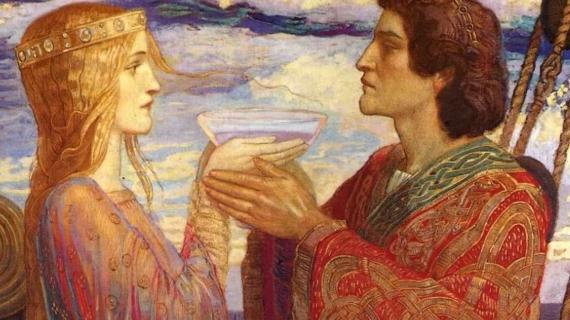Submitted by Michael Neininger
on
Annegret Oehme, Associate Professor of German Studies at the University of Washington, discusses TRISTAN UND ISOLDE in this podcast in advance of a new production at the Seattle Opera. Wagner’s inspiration for this amazing opera was the 12th century poem by Gottfried von Straßburg, a classic of medieval German literature. Wagner built on Gottfried’s timeless tale of impossible, frenzied love: some elements (such as the love potion) he transposes directly into opera, others he discards (the fight with the dragon), others he repurposes (the white and black flags).
I was given the opportunity to discuss the relationship between Wagner and his medieval source
in several ways: I wrote a text for the program notes, I spoke on a podcast, and I led a workshop.
This workshop was perhaps what felt most familiar to me, as it included a group of
approximately 25 “students” ranging from student-age (actual UW students) to well-retired
people, all of them eager to discuss literature and music. I thoroughly enjoyed my “assignments”
and hope I get to revisit this experience sometime in the future.
If you want to hear more about Wagner and his source – some music and some Middle High
German, you can listen to the podcast here [podcasts.apple.com].
Annegret Oehme writes:
As soon as I knew I’d be moving to Seattle in 2016, I got a subscription to the opera right away –
before even signing a lease for a new home. I have missed only one performance since then.
When I had the chance to work with Seattle Opera in my capacities as a medievalist, I didn’t
need a minute to think it over. In October 2022, Seattle Opera staged Richard Wagner’s Tristan
(1865) – an opera known for the portrayal of doomed love, for being very long, and for the
central role of a love potion that had audiences ever since scratch their heads.
Wagner, of course, took much inspiration from medieval literature for most of his operas; for
few of his pieces he worked as closely with a main source as in the case of Tristan. Wagner
based his libretto on the Middle High German Tristan (ca. 1210) romance by Gottfried von
Straßburg of which he owned three (!) editions. Wagner complements his adaption of the
medieval text with some other medieval sources (Gottfried’s text being a fragment only), the
philosophy of Arthur Schopenhauer (1788-1860), and the Hymnen an die Nacht (1797) by the
romantic poet Novalis (1772-1801).
before even signing a lease for a new home. I have missed only one performance since then.
When I had the chance to work with Seattle Opera in my capacities as a medievalist, I didn’t
need a minute to think it over. In October 2022, Seattle Opera staged Richard Wagner’s Tristan
(1865) – an opera known for the portrayal of doomed love, for being very long, and for the
central role of a love potion that had audiences ever since scratch their heads.
Wagner, of course, took much inspiration from medieval literature for most of his operas; for
few of his pieces he worked as closely with a main source as in the case of Tristan. Wagner
based his libretto on the Middle High German Tristan (ca. 1210) romance by Gottfried von
Straßburg of which he owned three (!) editions. Wagner complements his adaption of the
medieval text with some other medieval sources (Gottfried’s text being a fragment only), the
philosophy of Arthur Schopenhauer (1788-1860), and the Hymnen an die Nacht (1797) by the
romantic poet Novalis (1772-1801).
I was given the opportunity to discuss the relationship between Wagner and his medieval source
in several ways: I wrote a text for the program notes, I spoke on a podcast, and I led a workshop.
This workshop was perhaps what felt most familiar to me, as it included a group of
approximately 25 “students” ranging from student-age (actual UW students) to well-retired
people, all of them eager to discuss literature and music. I thoroughly enjoyed my “assignments”
and hope I get to revisit this experience sometime in the future.
If you want to hear more about Wagner and his source – some music and some Middle High
German, you can listen to the podcast here [podcasts.apple.com].
Minnelied example courtesy of Studio der Frühen Musik.
1)
